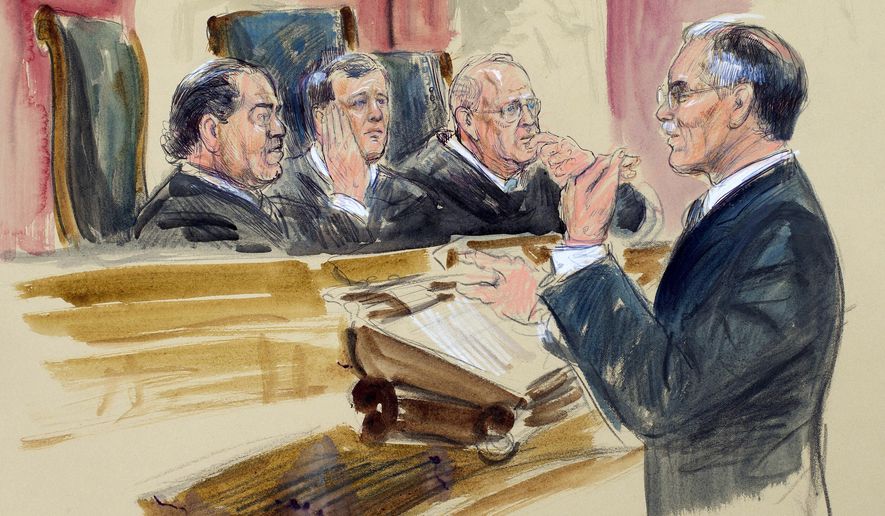Departing U.S. Solicitor General Donald Verrilli will be remembered for big wins at the Supreme Court on same-sex marriage and Obamacare, despite an overall weak record in defense of President Obama’s liberal agenda.
Mr. Verrilli, who announced Thursday that he would be stepping down this month, managed to guide the Affordable Care Act through four legal challenges before a conservative high court. He also worked on three cases leading to the justices’ decision in Obergefell v. Hodges last year to legalize same-sex marriage.
“Thanks to his efforts, 20 million more Americans now know the security of quality, affordable health care,” Mr. Obama said in a statement. “And our children will now grow up in a country where everyone has the freedom to marry the person they love.”
But as the government’s top attorney, Mr. Verrilli also lost a wide range of cases, including campaign finance reform, voting rights and presidential authority to make recess appointments. A study this year by the libertarian Cato Institute cited the solicitor general office’s “sheer statistical failure” during the first seven years of the Obama administration.
When he lost, he tended to lose big. From 2012 to 2014, Mr. Verrilli lost 13 cases by unanimous votes at the Supreme Court in a span of 30 months, about three times the office’s rate of unanimous losses under President George W. Bush.
His record in the court’s term that ended in June 2015 was eight victories and 13 losses, a winning percentage of 38 percent, said Ilya Shapiro, senior fellow of constitutional studies at Cato.
Analysts say the historical norm of wins for the solicitor general is about 70 percent.
“He has lost a lot of cases,” said Hans von Spakovsky, a senior legal fellow at the conservative Heritage Foundation. “It’s true that he won a very significant case in the original Obamacare decision, but when you look at his overall record, in comparison to prior solicitors general of both parties, he has a very high losing record.”
This week, the Supreme Court ruled unanimously against the administration in U.S. Army Corps of Engineers v. Hawkes, delivering a victory for private landowners by allowing a company to challenge regulations under the Clean Water Act.
Mr. von Spakovsky said the case illustrated a weakness in Mr. Verrilli’s tenure — that he often failed to persuade his boss, the president, against taking untenable legal positions to the high court.
“I frankly think he did not do what he should have done — advise the president and the attorney general when he believes they should temper the position they are taking, try to keep them from taking extreme positions,” he said. “He clearly didn’t do that, and that’s one of the reasons he lost so many cases 9-0.”
William Jay, who worked with Mr. Verrilli in the solicitor general’s office, said the administration hasn’t always taken Mr. Verrilli’s sound advice.
“He has very good judgment. It’s not always listened to by the people to whom he reports,” said Mr. Jay, a lawyer at Goodwin Procter.
He said Mr. Verrilli is fair-minded and excels at listening to diverse viewpoints within government when deciding how to present a case.
“One of the solicitor general’s most important jobs is behind the scenes, refereeing disputes between the different agencies about what the government will say when it speaks with one voice,” Mr. Jay said. “Often in those disputes, there’s no middle ground. Somebody wins and somebody loses. I think Don was good at finding common ground where possible and conducting the process fairly.”
Andrew Pincus, who has argued more than 25 cases at the Supreme Court, said Mr. Verrilli has performed “extraordinarily well” defending a progressive administration’s policies before a majority-conservative court.
“There have been a significant number of important victories,” Mr. Pincus said. “The multiple defenses of Obamacare have to be at the top of the list. In many of these cases, he was litigating before a court that perhaps was not naturally inclined toward the government’s position, and he really dug in and figured out a way to frame the arguments in the case that ultimately ended up being successful.”
In private, he said, Mr. Verrilli is “the most warm and generous person you could imagine.”
Mr. Verrilli, who worked in the White House counsel’s office before becoming solicitor general, hasn’t announced what he will do next. His deputy, Ian Gershengorn, is expected to be appointed acting solicitor general for the remainder of the administration.
• Dave Boyer can be reached at dboyer@washingtontimes.com.




Please read our comment policy before commenting.